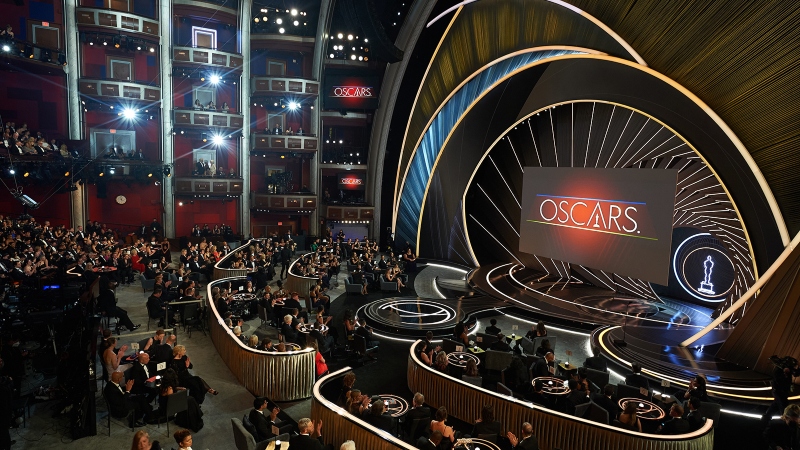Adverts
In a universe full of glitter and charm, the Oscar ceremony stands out as the most glamorous and anticipated event on the film calendar.
Since its first edition in 1929, the Oscars have not only celebrated talent and the art of filmmaking, but have also offered unforgettable moments that remain etched in the collective memory.
Adverts
This dive into the history of the Oscars reveals the episodes that transcended time, marking generations and transforming the awards night into a unique spectacle. 🌟
Oscar history is filled with iconic moments that captured the imagination of audiences and critics alike.
Adverts
Who doesn’t remember Halle Berry’s moving acceptance speech, the first black woman to win Best Actress, or the historic mistake that announced “La La Land” as the winner of Best Picture, when the real winner was “Moonlight”? These and other spectacular events are fundamental pieces of the Oscar legacy, reflecting the social, cultural and artistic changes over the decades.
In this journey through history, we relive episodes ranging from moving speeches to unforgettable gaffes, memorable performances and touching tributes. The Oscars ceremony is more than just an awards ceremony; it is a stage where cinema and life magically intertwine, offering moments that continue to inspire and fascinate the world. Get ready to explore the glamour, magic and surprises that make the Oscars an eternal celebration of the seventh art. 🎬✨

The Early Years and the Emergence of the Tradition
The Oscars, officially known as the Academy Awards, are more than just an awards ceremony. They are a celebration of art, glamour and, of course, iconic moments that are etched in the memory of movie lovers. Since their first edition in 1929, the Oscars have become one of the most anticipated events of the year for moviegoers. Just imagine, the first years were somewhat modest, without the splendor we know today. However, even back then, the aura of elegance and relevance that characterizes the ceremony to this day began to take shape.
The First Television Broadcast
It was in 1953 that the Oscars were broadcast on television for the first time, bringing the magic of cinema into people’s homes. Before that, only a select group of privileged people had the chance to witness the event live. Television broadcasts made the Oscars accessible to the general public and helped create many iconic moments. The ceremony became a spectacle not only to honor the best in cinema, but also to entertain and thrill millions of viewers around the world.
The Infamous “La La Land” and “Moonlight”
One of the most surprising moments in recent Oscar history happened in 2017. Who doesn’t remember the famous Best Picture blunder? When “La La Land” was mistakenly called and, moments later, “Moonlight” was announced as the true winner, the audience was shocked. This episode not only highlighted the unpredictability of live events, but also became one of the most talked-about moments on social media, proving that the Oscars still have the power to surprise and delight.
Related articles:

Memorable Thank You Speeches
Halle Berry Makes History
A speech that went down in history was the one given by Halle Berry in 2002 when she became the first black woman to win the Oscar for Best Actress. Her win for “Monster’s Ball” was not only a personal milestone, but also a significant moment in the fight for greater diversity and representation in film. A visibly emotional Halle Berry dedicated her award to all the talented black women who came before her and who, in some way, paved the way for that moment to become a reality.
The Power of Marlon Brando
Another unforgettable speech was Marlon Brando’s non-speech in 1973. Upon winning the Academy Award for Best Actor for his role in “The Godfather,” Brando sent activist Sacheen Littlefeather to refuse the award in protest of the film industry’s treatment of Native Americans. This audacious gesture sparked intense debate and is still remembered as one of the most politically charged moments in Oscar history.
Unforgettable Stage Performances
Beyond the speeches and awards, musical performances hold a special place in Oscar history. Who could forget Lady Gaga and Bradley Cooper’s powerful performance of “Shallow” in 2019? The chemistry between the two was palpable, and the performance captured the emotional essence of the song, leaving the audience in awe. Additionally, performances like Whitney Houston’s “One Moment in Time” in 1989 are remembered not only for their musical quality, but also for their ability to move and inspire.
Moments of Spontaneity
The Oscars are also known for their unexpected and spontaneous moments, which often steal the show. In 2014, Ellen DeGeneres, as host, created one of the most viral moments of the ceremony when she took a selfie with a group of Hollywood stars. The photo quickly became the most retweeted photo in history at the time, proving that spontaneity can create iconic moments and engage the audience in surprising ways. And who doesn’t remember Jennifer Lawrence tripping as she walked up the stairs to accept her Best Actress award in 2013? Moments like these bring a human touch to the ceremony and remind us that, behind all the glamour, the artists are also ordinary people.
Iconic Outfits and the Red Carpet
The Oscars red carpet is a spectacle in itself, where fashion and film meet in a celebration of style and creativity. Some looks have become legendary, such as Björk’s swan dress in 2001, which was widely talked about and remains one of the most memorable looks in the history of the event. On the other hand, Audrey Hepburn’s classic elegance in a Givenchy gown in 1954 continues to inspire fashionistas to this day. The red carpet is a platform for designers to showcase their creations and for stars to express their personalities, making it an essential part of the Oscars experience.

Diversity in Focus
In recent years, the issue of diversity at the Oscars has been a significant point of discussion. The #OscarsSoWhite movement, which began in 2015, brought to light the lack of representation among the nominees. Since then, the Academy has made efforts to make the awards more inclusive and reflect the diversity of the film world. Films like “Black Panther” and “Parasite” have not only broken records, but also paved the way for a new era where stories from different cultures and perspectives are celebrated. “Parasite”’s 2020 win for Best Picture, the first non-English language film to win the award, was a historic milestone and a testament to the universal power of cinema.
Surprises and Unforeseen Events
The Oscars are known for their unexpected twists and surprise wins. In 1999, when “Shakespeare in Love” beat “Saving Private Ryan” for Best Picture, many were surprised, as the latter was considered the favorite. These surprises, while sometimes controversial, contribute to the fascination and discussion surrounding the Oscars, reminding us that the film industry is full of surprises and that the outcome is not always predictable.
The Memorable Hosts
Hosting the Oscars is one of the most challenging and memorable roles of the night. Bob Hope, with his 19 appearances, set a standard for humor and elegance that still stands today. In recent years, hosts such as Billy Crystal and Whoopi Goldberg have brought their own brand of humor and charisma, creating moments that have stuck in the audience’s memory. The choice of host can set the tone for the night, providing laughter, reflection and, of course, unforgettable moments.
Honorary Awards and Tributes
In addition to the competitive awards, the Oscars also celebrate the careers and contributions of illustrious figures in cinema through honorary awards. These are often emotional occasions, as they celebrate lives dedicated to the art of film. For example, the 1972 honoring of Charlie Chaplin was one of the most moving moments, when he returned to the United States after 20 years of exile. These awards highlight the importance of recognizing the legacy and influence of great artists, reinforcing the enduring value of cinema.
Over the years, the Oscars have continued to evolve, reflecting changes in society and the film industry. Their iconic moments are testament to cinema’s ability to move, inspire and unite people around the world. With each passing year, the anticipation for new memorable moments grows, and the magic of the Oscars continues to captivate audiences, reminding us of the power of stories well told. 🎬✨
Conclusion
As we explore the most iconic moments in Oscar history, it’s impossible not to marvel at the evolution of this prestigious ceremony. From its humble beginnings in 1929 to the grand and accessible productions of the television era, the Oscars have always been a reflection of culture and society. The legendary blunder of 2017, when “La La Land” was mistakenly announced as the winner, only reinforces the unpredictable and emotional nature of the event. Likewise, historic speeches like Halle Berry’s and Marlon Brando’s bold gestures highlight the social and political relevance that the Oscars can assume.
Additionally, musical performances and spontaneous on-stage moments, such as Ellen DeGeneres’ selfie, add a human touch to Hollywood glamour. The red carpet, meanwhile, is a parade of style that continues to capture the imagination of fashion and film fans. Increasing diversity, driven by social movements, has transformed the Oscars into a more inclusive and representative platform.
Ultimately, iconic Oscar moments are a celebration of the magic of cinema, a reminder of the cultural impact of stories, and an invitation to reflect on the past, present, and future of the seventh art. 🎥🌟



